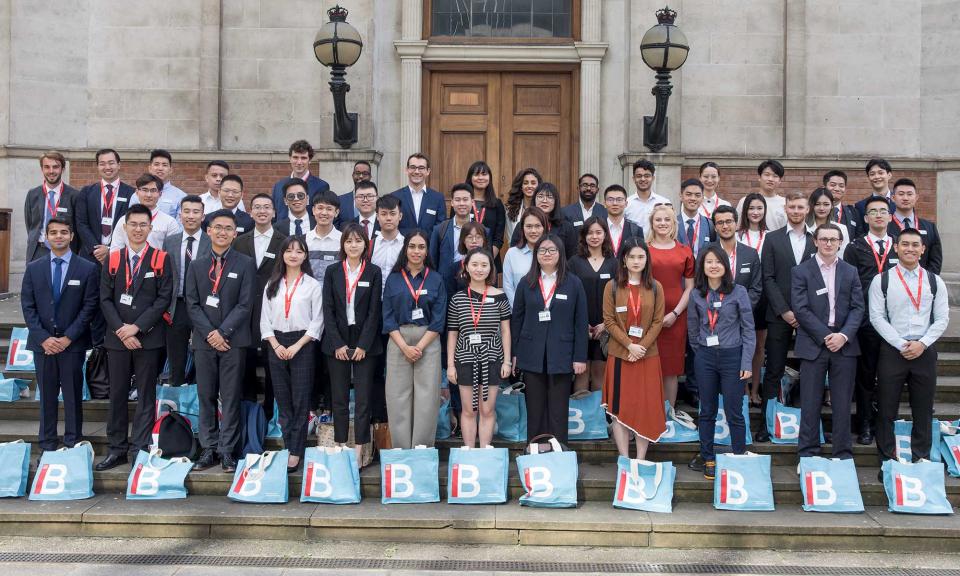
Published
Blog type
We are very excited to introduce you to our first cohort of students on the MSc Financial Technology programme at Imperial College Business School.
The finance industry has been transformed in recent years by the rise of new technologies and so we've added our Master's in Financial Technology to our portfolio of programmes in response to the knowledge gap that has been created by this shift in the industry.
The programme is the newest addition to our Finance Master's programmes, which are run by our world-class Department of Finance. Find out about the new class and discover what they have been up to since beginning the programme.
What does our new class look like?
- 57 students
- 40% female
- 16 nationalities represented
The new class echoes the Business School's emphasis on diversity, both from a gender perspective and by nationality. The top five countries students join the programme from are China, France, India, Ukraine and the United Kingdom. In addition, 40% of this year’s cohort is female.
As the programme is highly quantitative, the majority of students join from a computing degree background (26% of students) or a mathematics degree background (25% of students). This is followed by students from an engineering/technology background (16% of students).
The diversity of the cohort adds value to students’ experience on the programme, which is noted by MSc Financial Technology student Kevin Xuhui Li:
""My cohort is a group of talented, motivated, and ambitious individuals. The most amazing part of my cohort is that we are such a diverse group. We have people who studied computer science, finance, engineering, and mathematics, etc. You can always learn something new from your peers, whether in a group assignment or daily communication. I believe that immersing yourself in such a competitive and creative environment will bring out the best version of yourself.""
The programme
For many students who join MSc Financial Technology, the programme is a way to kick-start their career in financial technology. However, there are also students who join with the desire to work in the financial services more broadly, leveraging their specialist knowledge of fintech to differentiate themselves when job seeking.
Whichever route they take, the programme will prepare them for both general finance roles and fintech positions. One of the students in the new class, Yanina Opanasenko, shares her motivations for joining the programme:
""Having studied a BSc Economics and Econometrics, I realised the importance of technical analysis and how the financial industry is changing due to technological innovation. Learning to code became an interest of mine and I wanted to bring my skills to the next level, whilst working on projects with financial applications. MSc Financial Technology perfectly brings all these aspects together with the modules covering topics from blockchain technology to big data.""

At the end of the programme, Yanina will be starting a role as a Technology Business and Data Analyst at Morgan Stanley.
The programme is made up of five key components; online pre-study modules, a foundation module in financial technology, core modules, electives and projects.
The online pre-study modules ensure that all students have the basic knowledge and skills required for the start of the programme. When they come onto campus in September, students begin their studies a Foundations in Financial Technology module. This introduces students to the tools of modern finance, enhances their programming knowledge and starts them starts them planning for success in their career.
Students then complete their six core modules in topics ranging from Big Data to Blockchain and Applications, Financial Econometrics in R/Python and more. The electives give students the opportunity to tailor their studies to their career interests, as well as the opportunity to study and form connections with other students across the Finance Master’s programmes.
MSc Financial Technology student Paras Arora said:
""From learning cutting-edge and emerging technologies such as blockchain and machine learning to fundamentals of corporate finance and portfolio management, I have immersed myself into this vast world of tech and how it can improve the current finance sector. My favourite modules so far have been Advanced Corporate Finance and Big Data in Finance. These modules are preparing me to learn the core fundamentals of corporate finance and the different applications of machine learning in finance.""

The programme culminates in the choice of an Applied Project or a Work Placement. Both of these options give students an opportunity to develop a deeper understanding of an aspect of financial markets, the industry or the economy, and develop technical expertise in areas such as financial analysis, mathematical modelling, information technology, forecasting or computing.
Career development and additional activities
Alongside their studies, students work closely with Imperial College Business School Careers who help put them on the path to their dream career. Among the services Careers provides is one-to-one support; throughout the year students have access to a team of expert Careers Consultants. These sessions help them with everything from career planning, cover letter reviews, mock interviews and case study practise sessions all the way to guidance on negotiating job offers.
Careers also host industry-specific events and recruitment career fairs including the Fintech Careers Fair on campus that allows students to engage with employers at leading financial technology institutions. This year we welcomed Bloomberg, Coinrule, TransferWise, Moody's Corporation, Speedinvest and more onto campus.
Students on the programme can also gain valuable industry insights and create networks through our student-led Career Clubs, which are aligned to core industry sectors including Finance and Consulting. Students can also become involved in our Student Investment Fund.
Opanasenko said:
The best opportunity for me so far has been the chance to be a part of the Student Investment Fund (Quantitative Department). Taking on the role of the Director of Quantitative Operations, I am exposed to all the strategies we are currently developing, whilst also organising events for the Fund.
We look forward to seeing more from this class of talented, ambitious students and follow their journey to becoming leaders and innovators in the finance industry.
Applications are now open for MSc Financial Technology 2020-21.
